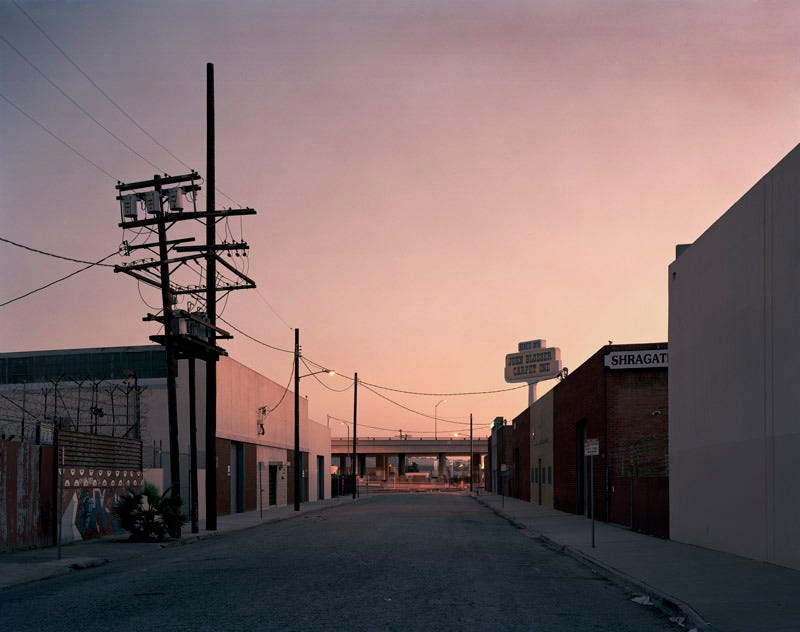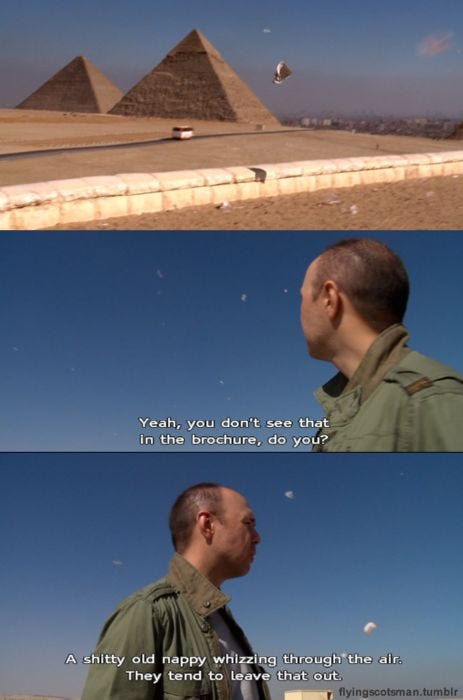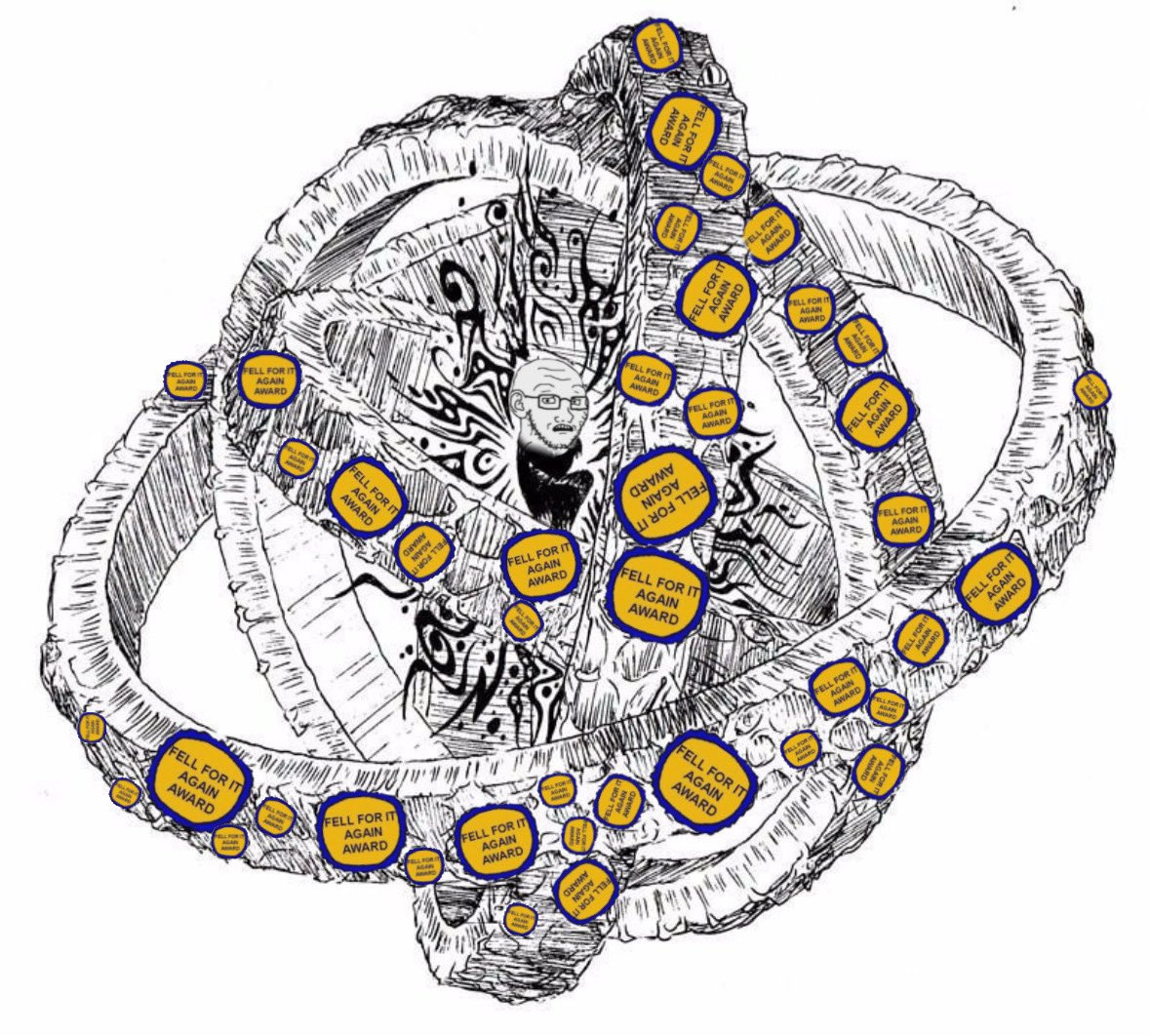views from the cave
Travel photography, chasing desire, my online boyfriend when I was 15, and has Karl Pilkington read Plato? Discuss.
When I was a teenager, I spent an awful lot of time curating pictures of destinations I would have sold my left kidney to visit, which just so happened to be anywhere that wasn’t where I lived. My old Tumblr blog features a tag called ‘places,’ which contains precisely 243 sets of photos of different spots that I wanted to see before I died. I went through every one of them the other night. Many are very obvious tourist destinations: Venice, San Francisco, and the blue city in Morocco, Chefchaouen, all appear multiple times. Some of them are eerie, liminal shots of places that seem to be nowhere in particular. One is captioned 'View South, 1300 Block of Channing Street, Los Angeles,’ as if from my bedroom in Coventry I had any idea where that was, let alone if it had any meaning at all. There is a certain self-important way in which people from the US talk about the US, that I have also found in London, where places of very little significance to anyone from the outside are referred to as if everyone will have at least passing familiarity with them. People did it in Oxford too, talking about the Bod (Bodleian Library), or the Glink (Gladstone Link, which is underneath the Bodleian), or their prelims (first-year exams) or sub fusc (black and white uniform you have to wear for exams) or any of the other twee bits of jargon that should immediately be retired and forgotten about upon leaving the place. It’s a subtle and particularly annoying way of asserting dominance over your interlocutor, of making them feel stupid and out of place while maintaining plausible deniability.
Many of these places I posted photos of are places I have now visited. I still haven’t been to Morocco or San Francisco, but I did go to Venice and thought it was criminally overrated: it was packed with obnoxious rich idiots falling for the most obvious tourist traps in the book and it stank and I much preferred Verona, its equally beautiful but more unassuming neighbour. There are a number of pictures of New York and Thailand, both of which I visited not too long after the time of posting. There are three of Hong Kong and its vertiginous high-rise buildings, a mise-en-abîme of identical residential flats, which I will see when I visit in July. I don’t know why I found these so interesting that I reposted them three times. Maybe at that age, they were taller than any building I had ever seen before, and there were hundreds of them. It was too much for my little mind to comprehend. A city built upwards instead of horizontally. All I craved was something different to what I knew.
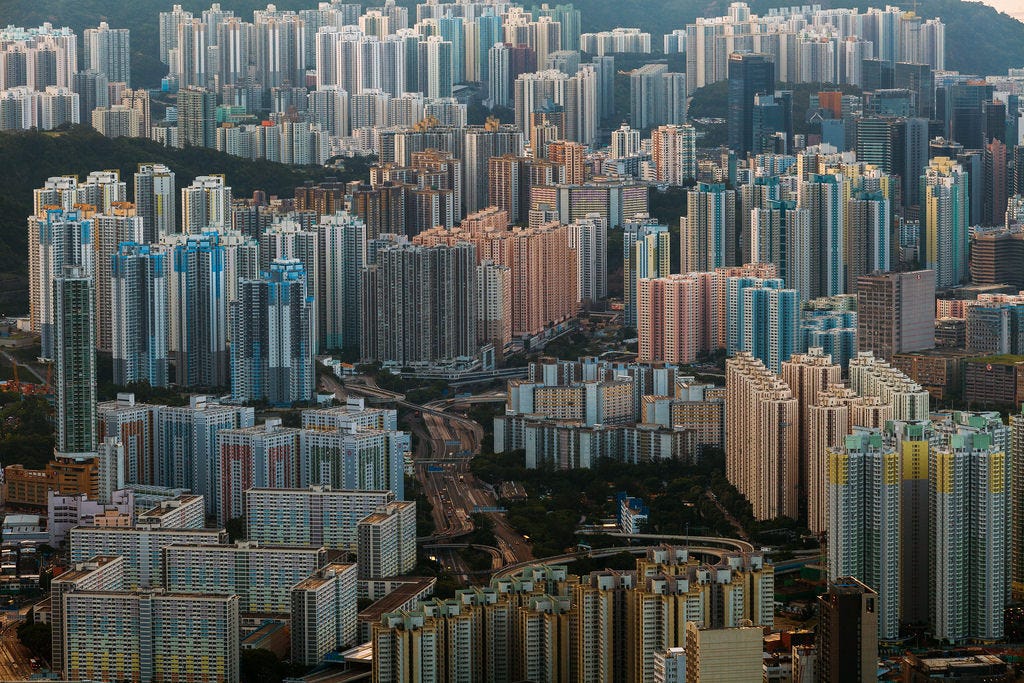
Paris is also there. This makes my heart swell. Teenage me has commented numerous variations of ‘omgggg I can’t wait to live there <3’ and ‘I miss it so much :(‘ even though I had been there only once at that point, on a school trip. But live there I did, and all of the photos look like something I could have seen from my own apartment, an old chambre de bonne on the sixth floor with no lift access, ten square feet with my shower cubicle next to my kitchen area and a toilet shared between six dans le couloir. It was 600 euros per month, but what I paid for was the view, as the Eiffel Tower was visible from my window. What I loved looking at most, however, was the interiors of other people’s homes. These apartments were far bigger than my own and had proper living areas, bookshelves full of books, chenille rugs, intricate moulding. I would watch how they lived, wishing it was me, but also being curiously thankful that it wasn’t and that I could just look at them: as Karl Pilkington’s maxim goes, ‘I’d rather live in a cave with a view of a palace than live in a palace with a view of a cave.' They looked exactly like the pictures I had aspirationally reposted not even ten years prior from my house in the Midlands. I had outgrown the old cave and moved into one with a better, closer view.
It all makes me strangely emotional. Part of it is that my family didn’t have enough money to take us abroad until my teen years, at which point my parents’ careers really took a steep upwards curve and we finally went to Greece, which remains one of my favourite countries to visit. Until then, I felt a claustrophobia that sickened me, a frustration that I had never stepped off British soil, that I had been confined to this place of all places when there was so much else out there. But Paris always felt like a given: I would move heaven and earth to end up there. What really arrested me was the places I never knew would hold so much meaning to me, where I had probably reposted the photos to make my blog look nice and then promptly forgotten about them. There’s another picture of rural Victoria. One of Milford Sound. I felt my breath catching in my throat.
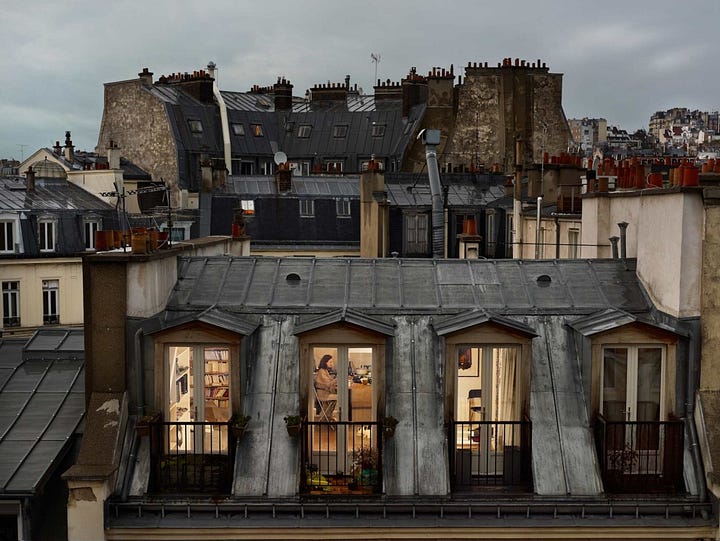
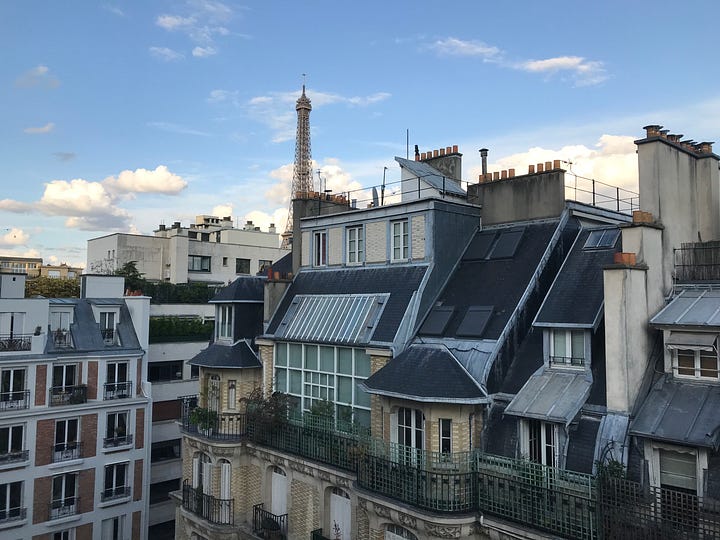
Quite a bit of cultural criticism has been written that alludes to Tumblr blogs as archives or time capsules of the lives of teenage girls born between around 1990-2002, although none of it felt particularly memorable beyond the first few hundred pieces I skimmed on the subject, such is the nature of this website. What I find more interesting is the idea of it as a vision board of sorts for the person I wanted to be while my life felt as if it was suspended in permafrost. I didn’t want it to reflect my life as it was. As a person I felt boring and maladjusted with nothing much to offer from my limited perspective. I wanted it to be representative of my potential, who I could be one day. There is a certain dogged optimism there that I can’t quite fathom now. Was it just childlike naivety, or did things genuinely feel more possible during the 2010s? In the UK, we were only a few years into the cruel austerity agenda of the coalition government following the 2008 financial crash. It was terrible and people suffered on an unprecedented scale during that period, but ostensibly not enough for the electorate not to vote the Conservatives in a second time, and then a third, and then a fourth, and then a fifth but in a red tie this time, not realising things could always get worse.
I never knew love as a young teenager: not real, all-encompassing puppy love like my best friend and her first boyfriend; not even a dodgy situation of questionable legality with a boy in sixth form while I was fourteen or fifteen, like a number of the other girls I knew. Until I was seventeen, I did it all painfully, unbearably alone, bar an online boyfriend when I was in year 10 who I met in person only once. He told me he loved me after a week of ‘knowing’ me and then I found out he was a furry and wanted to break it off there, but he had POTS and I had a genuine fear that if I broke his already physically fragile heart I would kill him. I didn’t want to have blood on my hands, so after five months of this clingy wet blanket of a teenage boy treating me like a convenient second mother, I manufactured an argument so I wouldn’t feel evil for blindsiding him out of nowhere. I tend to attract the kinds of men who tell me in as many words that they’d keel over and die without me, which is likely why I have a habit of falling into the sort of head-over-heels, all-consuming infatuation with those who probably couldn’t care less if I lived or died. I like to think my teenage years set me up to be fiercely independent, which it kind of did, but now I get a deep-seated urge to reveal myself to someone who I know will have no choice but to abandon me before I get bored. I’d rather die than have to make my own decision to leave.
When I looked at these pictures and pinned them to my online cork board, I always imagined there would be someone there with me. Not him, the online boyfriend, but some nebulous mystery person with whom the honeymoon phase would never run dry. I suppose I’m suspending myself in this state right now: no promise of romantic fulfilment or commitment or close proximity, but a long-distance yearning, a certain idealisation. There will be someone there when next I travel, if only for a little over a week, and then potentially never again. I’ve technically got what I wanted. Really, I have.
I have been dipping my toe into Susan Sontag’s On Photography, since my PhD project deals heavily with postmemory, which was originally about family photographs as artefacts for second-generation Holocaust survivors navigating the previous generation’s collective first-hand experiences, before branching out into literature and film. The first line is as follows: ‘Humankind lingers unregenerately in Plato’s cave, still revelling, its age-old habit, in mere images of the truth.’1 I have to admit that I first came across the basic premise of Plato’s cave allegory not through Plato himself but through the Chinese idiom, 盲人摸象 (máng rén mō xiàng), roughly translated as ‘blind men feeling the elephant’. It’s an approximation of the metaphor, but close enough: each of the blind men feels a different part of an elephant and insists that their part is representative of the whole elephant. I don’t know if Karl Pilkington has ever read Plato — I wouldn’t put it past him, the man is full of surprises — but being in his cave with the blinkered view of the palace feels somewhat adjacent. As an individual, he’s the sort of person who would be content just looking at the palace and appreciating the aesthetic value it brings instead of living it, desiring it, needlessly overcomplicating things. You could simply stare at it, believe that is all there is, and move on. This ambivalence is why the entire premise of An Idiot Abroad works. It’s the relatability of disillusionment.
But I think more generally there is a need to strive towards something or to look outwards that undercuts his individual cynicism: none of us want to be permanently stuck in our own interiority, regardless of whether we’re living in a big hole in a rock or in a castle, thinking is this it, forever? Most people want to know the unknown, the outside world, even if they’re convinced that shadows on the walls constitute the whole of that world, or that an elephant must be long like a snake because they’ve only ever felt the trunk. I was looking at these photos thinking I could live them. I thought any one of them would fill this hungry void in me that was simply waiting for a life to start, any sort of life but this one, inhibited and indistinguishable from day to day. In certain ways I did start living by seeing these places in real life. In others, I realised I was looking at the photos and taking them as incontrovertible fact: that everything outside of my reach was perfect and beautiful and true and everything within it would never quite match up. It wasn’t a terrible life, not even just mediocre. I was very blessed. But I carried into early adulthood the conceit that I needed to have an extraordinary life for it to be worth anything. In reality, I was just a teenager who was bored.
Sontag writes a lot about the act of photography, but all I was doing was consuming those photographs while taking very few myself. She tells us: ‘Photographs can abet desire in the most direct, utilitarian way—as when someone collects photographs of anonymous examples of the desirable as an aid to masturbation.’2 The way I would look at them, gormless and wanting, felt similar to this. Much like the chase, like the avoidant half of my anxious-avoidant impulses, the more accessible they felt, the more the wonder wore off. I fell in love with Paris because it felt like sand slipping through my fingers with every passing minute I stayed there, fell in love with New Zealand because it was so far from home and didn’t know if I would ever return. Fell in love with Greece and my ex because they were the first and felt like a triumph. I didn’t fall in love with Australia because I had to live there, day in day out, with no reprieve, and was stuck in the knowledge I would have to stay for a whole year whether I liked it or not. But I’ll fall for anyone and anything that is fraught with uncertainty. Anything that is doomed to end before it has begun.
Sometimes I think we’re better off not knowing. Not going to the places you see on screen — my dad warned me not to watch The Last Emperor before going to Beijing, because the Forbidden City would be grey and underwhelming in comparison to the glorious technicolour of the film. Not meeting your heroes. Not loving your heroes. Some things are only sweet because they are short, but what I wouldn’t give to live a thousand short, sweet lives, only occasionally learning from my mistakes.
Susan Sontag, On Photography, 1st Penguin Edition (Penguin, 1979), p. 1.
Sontag, p. 17.





